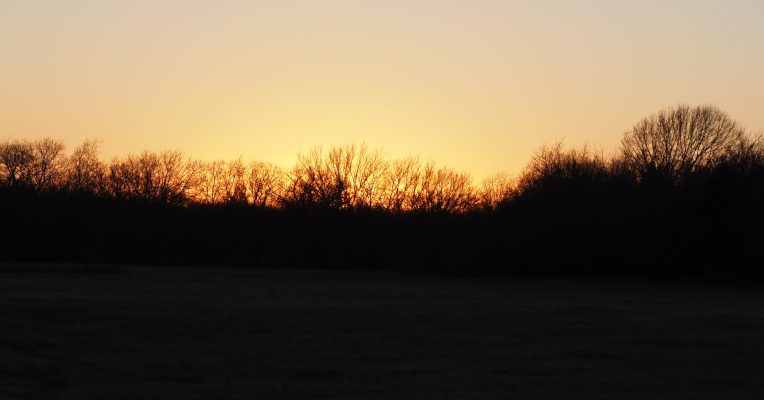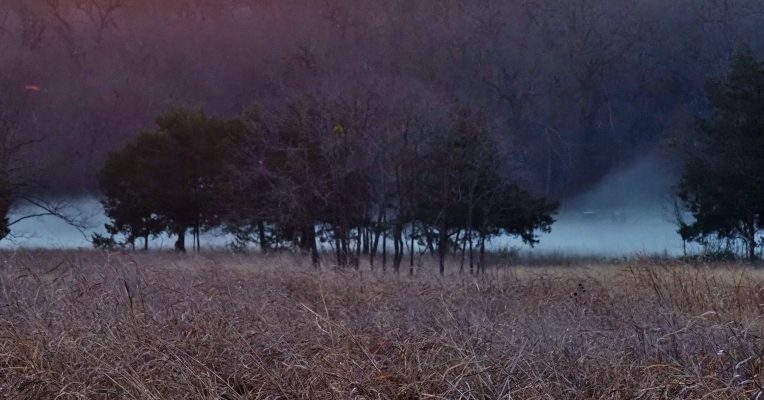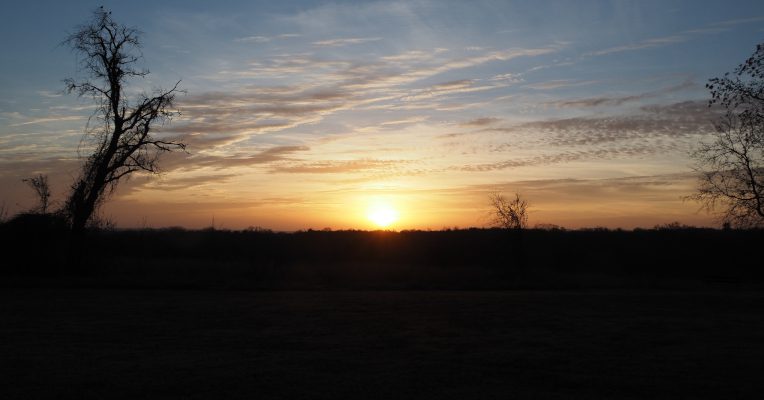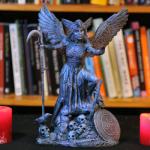Here’s an interesting question with some deep implications:
We’ve been through a period of time where many of us apparently had some foreknowing of difficult times to come. Are you aware of this happening before in Neopagan times (roughly since 1900) and how does it fit into your theology?
I can’t think of a time prior to recent years when modern Pagans were predicting difficult times to come. I’m not a historian, but I’m more than a little familiar with the origins and development of the modern Pagan movement. I’m pretty sure the reason I can’t think of one is that there aren’t any.
Now, there are prophets of doom in every era, in every decade. Most of them are misanthropes and malcontents. Some are mentally ill. I’m not interested in digging up some Pagan version of a street preacher who managed to be a stopped clock that’s right twice a day. In the history of modern Paganism, you just don’t find many (or any) authors, teachers, and other public figures predicting difficult times to come.
Quite the contrary. Many of the key figures of the early modern Pagan movement (which I usually date from the founding of the Golden Dawn in 1887) predicted a new era – a New Age – of peace and enlightenment. Aleister Crowley said humanity was moving from the Aeon of Osiris to the Aeon of Horus, when “freed of the obsession of the doom of the Ego in Death, and of the limitation of the Mind by Reason, the best men again set out with eager eyes upon the Path of the Wise.”
Until very recently, most Pagan and occult leaders expected things to get better – and they expected to be a big part of the reason why.
We need to begin by looking at this from a human perspective.
A Renaissance of ideas and possibilities
While modern Paganism has roots in the beliefs and practices of our ancient ancestors, the return of Paganism as a religion (or religions, to be more precise) began with the Renaissance.
Recent scholarship has begun to show that the Dark Ages weren’t so dark and dreary after all. They were just a time of relative isolation in Europe, when it was hard for ideas to be communicated and preserved. The invention of the printing press and the expansion of trade brought about an expansion of ideas, including rediscovering the art, stories, and religious practices of the ancient Greeks and Romans.
To some they were myths, to some they were quaint ideas, and to some they were inspiring. In the words of Druid and philosophy professor Brendan Myers “people got tired of the austerities of Christian discipline and the misanthropy of the Doctrine of Original Sin.” For a society that was thoroughly Christian (often oppressively so), the rediscovery of Paganism was like a breath of fresh air.
The earliest modern Paganism was about dreams of a better way of living.
The beginnings of the Druid Revival
Ross Nichols’ story that the modern Druid movement was founded in the Apple Tree Tavern in London in 1717 is more apocryphal than historical, but that date is a fair approximation for the beginnings of the Druid revival. There is evidence for people considering themselves to be Druids as early as the late 1600s, and the first documented Druid order was founded in 1792.
It is not coincidental that the Industrial Revolution began about the same time. For all that the Industrial Revolution improved living standards, it also uprooted society and desecrated the environment. In 1804, William Blake (who Nichols included in his list of Chief Druids) wrote about “England’s green and pleasant land” and also about its “dark satanic mills.” Modern Paganism is in part a response to the disruption of the Industrial Revolution.
But while there are plenty of examples of 18th and 19th century Druids and Pagans complaining about industrialization and romanticizing pastoral life, I can find no examples where they prophesied about coming bad times. They were complaining about their current times and presented their spiritual path as a better alternative.
An era of near-continuous progress
By the time the Pagan Movement started to shift from “Christians with Pagan leanings” to “actual Pagans” in the late 19th and early 20th centuries, the Myth of Progress was in full swing. We had the telegraph, then the telephone, then radio. We had the beginnings of modern medicine and a tremendous growth in life expectancy. We had the end of slavery and the extension of voting rights to women.
The world was getting better and better and there was no reason to expect that trend wouldn’t continue.
20 million people died in World War I, but it was called “the war to end all wars.” That was a bad prediction, but it reflected the general optimism in the wider culture. By the 1950s Jack Parsons could rant against “the pretense and lying hypocrisy of Christianity” and advocate for “an end to prudery and shame, to guilt and sin, for these are of the only evil under the sun” and do so with the expectation that it would come to pass.
Things were bad (relatively speaking) but they were getting better. People expected they would continue getting better. Were they seeing / intuiting the future or were they just assuming their then-current trends would continue? I don’t know. I do know people who expect things will keep getting better don’t issue prophecies of decline and demise.
No trend lasts forever
I once heard a UU minister (sadly, I can’t remember who) tell a children’s story with the tag line “good things happen, bad things happen, life goes on.” The story encourages us to live a calm and balanced life and to reject the tendency to get too high in good times or too low in bad times. There is wisdom in that story.
But it doesn’t change the fact that the past 300 years have been a time of remarkable progress, at least in the West.
It is unnecessary to list the events over the past 50 years or so that have gotten us to where we are today. By themselves, none of them are enough to signal anything more than the kind of temporary setbacks that are always part of life. Taken together, though, they tell us that this isn’t just a short-term problem. It’s the end of an era, and the beginning of what some of us are calling Tower Time.
I started hearing about it from my Gods – especially the Morrigan – somewhere around 2010. I didn’t know exactly what it meant. I just knew it was important, and there were things I needed to do to get ready – not so much physical preparations as building skills.
And now we know. Or at least, we know what’s happened so far. We don’t know what’s coming next, but we know the general trend. And it’s not good.
The Theology of Tower Time
The question asked how this fits into my theology. If the Gods (or at least, some of Them) warned us in 2010 that Tower Time was coming, why didn’t They tell us what to do in 1970 or 1980 or 1990 that would have helped us take a different path?
Who’s to say They didn’t?
I’m not saying They did. I am saying They’re known for speaking softly and subtly. Sometimes so softly and subtly that those who aren’t paying close attention can’t hear Them.
Last year I wrote The Theology of Tower Time, about what our experiences of the Gods in the context of Tower Time tell us about Them. I listed five things we can say: They are moving, They are concerned with more than just humans, They remain and will remain, and They are always mysterious. And perhaps most importantly, being on Their side has advantages.
Nothing we’ve discussed in this post would cause me to revise any of that.
The perspective of the Gods
I would now add that the Gods are doing what They do – in accordance with Their values and virtues – regardless of the circumstances.
In the early years of the modern Pagan movement, They were reintroducing Themselves to humanity. In our time They’ve become more active in forming and maintaining relationships with individuals and groups. My experience and analysis – and that of many of my co-religionists – tell me They are active in our world and are responding to our crises, but They are responding in Their own ways for Their own reasons. Much as I might wish otherwise, I see no evidence any of Them have chosen a side in our social, economic, and political conflicts.
That’s not to say They’re above it all. It is to say They have a perspective, a vision, and a direction that does not align with any of our political parties and philosophies.
This does not give us permission to “not get involved in politics.” Rather, it reminds us that our first calling is to live virtuously and heroically, regardless of our circumstances – and regardless of who’s in power in which country or region.
Good things happen, bad things happen, life goes on
So, where does all this leave us?
Christianity teaches that time is linear, from creation to apocalypse. Paganism teaches that time is circular – what has happened before will happen again. If you’re looking for the Grand Plan of the Gods, you aren’t going to find it. I’m pretty sure there isn’t one.
Worship your Gods. Honor your ancestors. Respect the land where you live, and the persons – both human and not – who share it with you. Take care of yourself, your family, and your community.
Perhaps there’s more wisdom in that UU minster’s story than I thought…




















